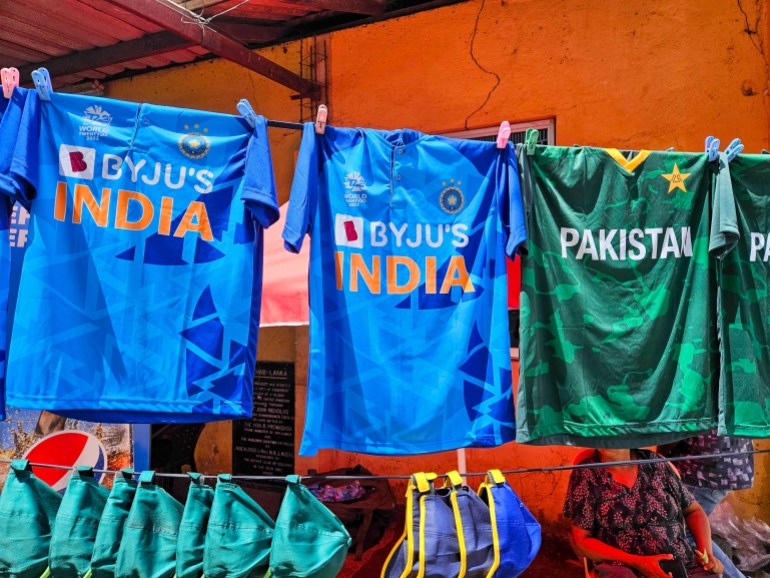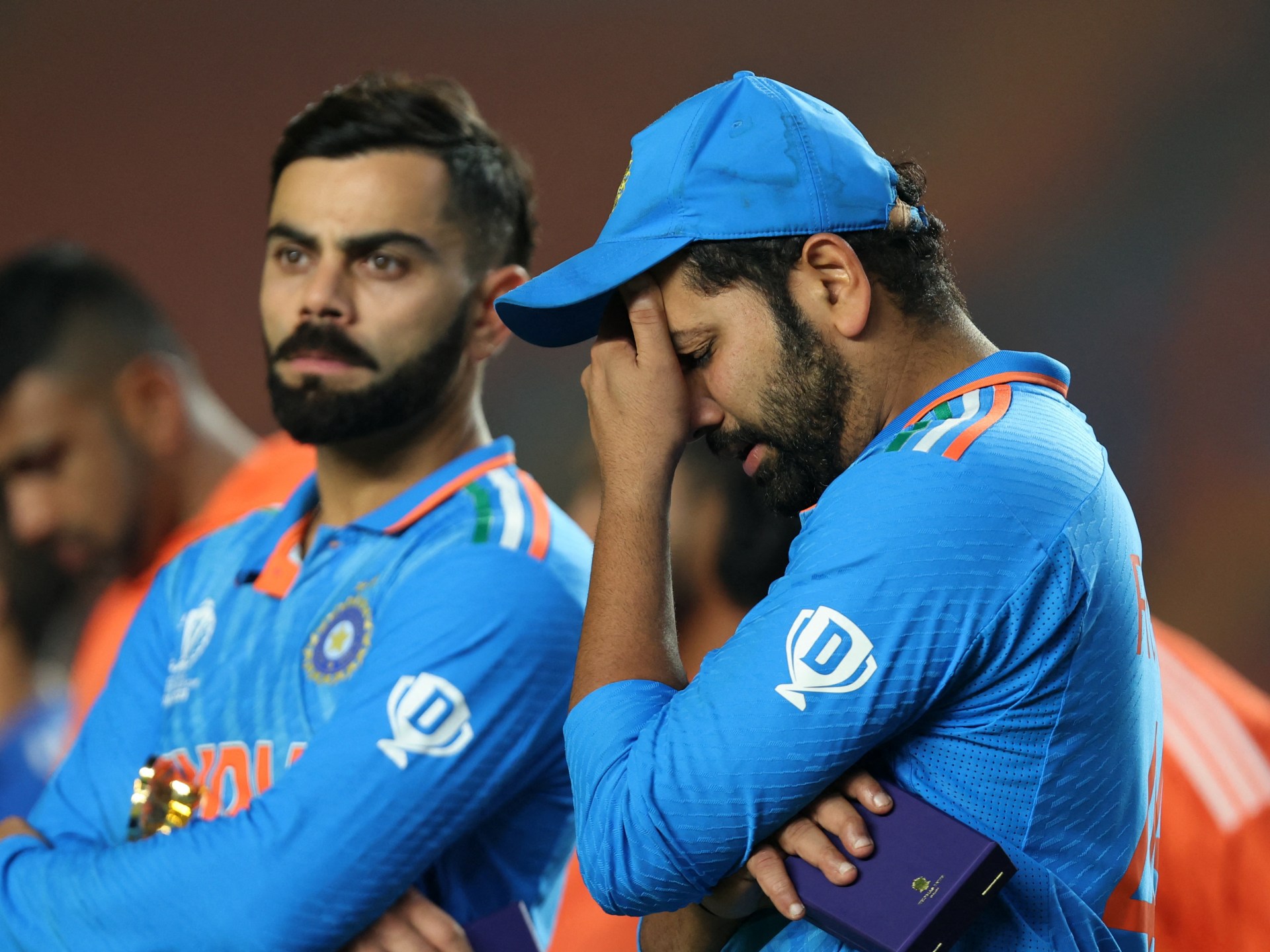Cricket’s whirlwind year began as South Africa lit up a home Women’s T20 World Cup with a stunning run to the final, only to come up against the mighty Australians who crushed the home crowd’s hopes and walked away with a record-extending sixth title.
And 2023 ended in a similar manner: India hosted the men’s 50-over World Cup and the home favourites charted a blistering undefeated run to the final at the sport’s biggest stadium in Ahmedabad but were handed a shock six-wicket loss by five-time champions Australia.
Between the two tournaments, plenty of news, action and big results shook the cricket world. Al Jazeera looks at the 10 biggest moments in the sport in 2023:
1. Australia repeat a three-peat of T20 titles
The ninth women’s T20 World Cup opened with Sri Lanka’s thrilling win over hosts South Africa but the Proteas soon bounced back and reached the final after a win over mighty England.
The Australian juggernaut, led by Meg Lanning – powered by Beth Mooney’s 53-ball 74 and their experienced bowling unit’s controlled performance – beat the hosts by 19 runs in a closely-fought final in Cape Town.
2. Women’s Premier League takes off in India
On March 4, India launched its women’s version of a lucrative T20 franchise league amid fanfare. Top players from across the world were pitted against each other in five teams a week after the T20 World Cup.
More than $580m was spent on acquiring the five franchises and broadcasting rights were sold for $117m over a five-year period.
India and Mumbai captain Harmanpreet Kaur lifted the inaugural trophy after her side beat Lanning’s Delhi by seven wickets in the final. The league has been touted as a game-changer in women’s cricket, much like its men’s version, the Indian Premier League.
3. South African legend Shabnim Ismail retires
The fastest woman in cricket called time on her 16-year international career, which began as an amateur player in 2007. Ismail went on to play 241 international matches for South Africa and is their all-time leading wicket-taker in international matches with 317 scalps to her name.
Her 191 one-day international (ODI) wickets are second only to India’s Jhulan Goswami, while her participation in all eight T20 World Cups and four 50-over World Cups is a testament to her legendary status in the game.
Ismail cited a desire to “spend more time with my family, particularly my siblings and parents as they get older” as the deciding factor but said she will continue to play league cricket.
SHABNIM ISMAIL RETIRES 🚨
Legendary fast bowler Shabnim Ismail has announced her retirement from all forms of international cricket for the Proteas Women with immediate effect to focus on her family 🏏
2⃣4⃣1⃣ internationals
3⃣1⃣7⃣ wicketsThank you for everything Shabnim 🙏 pic.twitter.com/GqzD9WZNn5
— Proteas Women (@ProteasWomenCSA) May 3, 2023
4. India vs Pakistan takes centre stage Asia Cup
After months-long deliberations and discussions, India refused to play its 2023 Asia Cup matches in host nation Pakistan and more than half of the fixtures were moved to Sri Lanka.
The hotly-anticipated India-Pakistan group A match was washed out by heavy rain in Kandy, prompting fears of a similar scenario in their Super Four clash. With more rain forecast in the capital Colombo, tournament organisers added a reserve day for the marquee fixture, prompting criticism from fans who termed it a financially-motivated decision given the interest in the match. The reserve day did come into play and India walked away with a huge 228-run win. They lifted the trophy a few days later with a 10-wicket win over Sri Lanka.

5. World Cup opens to empty stadium
The men’s 50-over ICC Cricket World Cup was meant to attract millions of fans in cricket-mad India to the 10 stadiums across the country. However, a glaringly empty Narendra Modi Stadium in the tournament’s opening match at Ahmedabad left fans shocked and set the tone for all matches not involving the host nation.
While all India matches saw fans pack the venues in a sea of blue shirts, others were far from being filled, leaving fans to question ticket sales, tournament scheduling and marketing.
6. Afghanistan go from minnows to contenders
Afghanistan opened their World Cup campaign poorly, with losses at the hands of Bangladesh and India, but picked themselves up to beat England, Pakistan, Sri Lanka and the Netherlands to give themselves a shot at a semifinal spot.
Their top-order batters combined their skills with quiet confidence, while the Rashid Khan-led spin bowling sent their opponents reeling. Despite not being able to qualify for the last four, the team left India with their reputation changed from minnows to world beaters.
7. Cricket gets Olympic nod
The International Olympic Committee (IOC) added cricket, among five sports, to the 2028 Los Angeles Games after a request by the host city in October.
Cricket last appeared at an Olympic Games in 1900. The Los Angeles Games are likely to feature six teams – for both men and women – playing the T20 version of the game.
8. Maxwell magic lights up Mumbai
Australia were staring in the face of defeat against a rising force in the shape of Afghanistan when Glenn Maxwell walked onto the pitch at 91-7 and hobbled off it having won the match for his side.
Maxwell’s 201 runs were littered with fours and sixes hit with minimal foot movement as he struggled with cramps all over his body. Nevertheless, his big-hitting and a 202-run partnership with captain Pat Cummins took them over the line and broke Afghan hearts.
Against the odds 🙌
The stats behind one of the greatest ODI knocks ever 📲 https://t.co/rv0UVeOWYZ pic.twitter.com/F5LI5xGEXv
— ICC Cricket World Cup (@cricketworldcup) November 8, 2023
9. Virat Kohli scores 50th ODI century
When India began their World Cup campaign, Virat Kohli was on 47 ODI centuries, two behind his idol Sachin Tendulkar’s record. As the tournament progressed and Kohli took up an anchor’s role, it became evident that breaking the record for him was only a matter of time.
Every match brought his fans to the edge of their seats but the former India captain made them wait until his birthday on the day of the semifinal against New Zealand, with Tendulkar in attendance to mount the summit.
10. Australia stun India to lift sixth title
After a stunning 10-match unbeaten run through the group stages and the semifinal, it seemed only a matter of time before India would lift their third World Cup title at home to delight the nearly 100,000 Indian fans in Ahmedabad.
But Australia had other plans in mind when they stepped onto the field at a surprisingly slower pitch at the final’s venue. From stemming the flow of runs to grabbing impossible catches, the five-time champions had India in trouble by dismissing them for 240 runs.
Despite an initial stutter, the experienced Travis Head and Marnus Labuschagne took the team in green and gold home with seven overs and six wickets to spare.
The shock and agony on the faces of the Indian players and fans told the story of a scarcely believable ending to what was meant to be the crowning glory for Rohit Sharma, Virat Kohli and company.
ℂℍ𝔸𝕄ℙ𝕀𝕆ℕ𝕊 𝕎𝕀𝕋ℍ 𝕋ℍ𝔼 🏆#CWC23 pic.twitter.com/7PGtzziVoc
— ICC Cricket World Cup (@cricketworldcup) November 19, 2023
Check out our Latest News and Follow us at Facebook
Original Source

